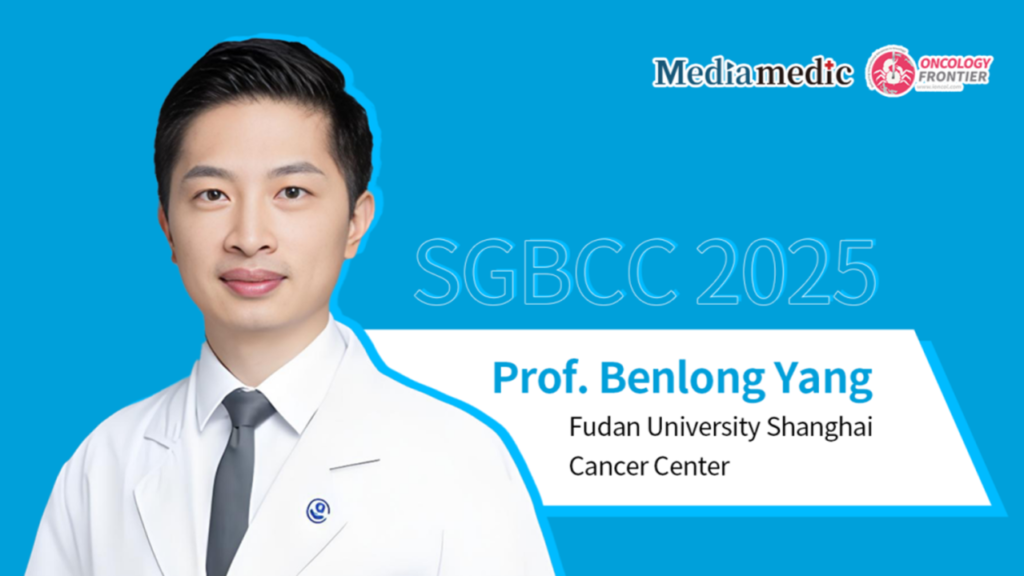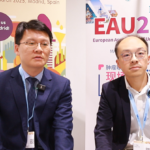
The 19th St. Gallen Breast Cancer Conference (SGBCC) took place in Vienna, Austria, from March 12 to 15, 2025. As one of the most prestigious biennial academic events in breast cancer research, SGBCC gathers leading global experts to discuss evolving treatment strategies for early breast cancer, voting on recommendations that shape clinical practice. Notably, this year’s SGBCC will feature a China-focused session, marking a significant milestone. Additionally, Prof. Benlong Yang from Fudan University Shanghai Cancer Center has been named SGBCC’s “Youth Education Ambassador” and “Social Media Ambassador.” This marks the first time a Chinese expert has been awarded such distinctions at SGBCC.Oncology Frontier: Professor Yang, the biennial SGBCC conference is about to begin, and you have been appointed as the first Chinese scholar to serve as both the Youth Education Ambassador and Social Media Ambassador. How do you perceive these roles, and what key responsibilities will you undertake at this year’s conference?
Prof. Benlong Yang: First, I would like to thank everyone for their continued attention to the St. Gallen International Breast Cancer Conference. SGBCC is held every two years with the goal of advancing standardized treatment practices for early breast cancer. As we all know, early-stage breast cancer represents the only window for achieving a clinical cure, and implementing standardized treatment at this stage significantly improves cure rates.
This year, I am deeply honored to be the first Chinese scholar to receive the official titles of Youth Education Ambassador and Social Media Ambassador at SGBCC. I believe these roles serve two major purposes. On one hand, the conference aims to leverage China’s vast social media platforms and extensive audience reach to spread the concept of standardized treatment to a broader audience. On the other hand, we also hope to introduce more educational initiatives to enhance continued medical education.
Each year, SGBCC features numerous lectures on standardized treatment as well as debates on controversial therapeutic approaches. This year, we plan to translate key conference content into Chinese and bring it back to China. By sharing these insights via social media, we can provide young and community-based physicians with direct access to the latest global developments in breast cancer treatment.
Oncology Frontier: This year’s SGBCC will host the first-ever China-focused session, a collaborative effort between CSCO and SGBCC. In your view, how can this session help amplify the voices of Chinese experts on the international stage and expand China’s global influence in breast cancer research?
Prof. Benlong Yang: Over the past four to five years, thanks to the leadership of Professor Zhiming Shao, Academician Binghe Xu, Professor Zefei Jiang, and Professor Yongmei Yin, breast cancer diagnosis and treatment in China have made tremendous progress. We are seeing a growing presence of Chinese research data, Chinese voices, and even homegrown innovative drugs entering the international arena. More importantly, China-led clinical research is now actively shaping global guidelines.
This year, we are proud to witness the establishment of a dedicated China session at SGBCC, where esteemed Chinese experts, including Professor Zhiming Shao, Academician Binghe Xu, Professor Zefei Jiang, and Professor Yizhou Jiang, will present data from China’s innovative drugs and share their experiences in clinical translation.
This China-focused session is set to make a significant impact in two ways. First, we aim to offer new perspectives for international experts through China’s clinical research and real-world data. Second, by engaging in discussions with top global experts, we can further refine our clinical research strategies and enhance the quality of our future studies. Ultimately, this will help drive meaningful changes in global breast cancer clinical practice.
Oncology Frontier: As the first Chinese Social Media Ambassador for SGBCC, what advice would you give to young physicians on making a mark on the international stage? What opportunities should they seize, and what skills should they develop?
Prof. Benlong Yang: I believe that China’s voice is becoming increasingly influential in the global breast cancer community. In the past, young physicians were primarily encouraged to gain recognition within their own province or country. However, today, we should set our sights higher, striving to establish our presence on the global stage and build connections with top-tier international experts.
So how can young doctors achieve this? First, seize every opportunity to speak at international conferences. While there are many online and in-person meetings today, we must value every chance to present, ensuring our insights and critical thinking are reflected in our talks.
In today’s AI-driven era, tools like DeepSeek and Kimi can generate slide decks within minutes. However, such slides lack personal insight and original thought, which is why I do not recommend relying solely on AI-generated content. Whenever given the opportunity to speak—whether on a small or large stage—it is crucial to be proactive, well-prepared, and meticulous in delivering content.
Second, practice spoken English. Never miss the chance to engage in direct conversations with international experts. These real-time exchanges are essential for establishing yourself in the global medical community. By leveraging these opportunities, young doctors can gain greater exposure, showcase their expertise, and contribute to elevating China’s presence in international oncology.
Oncology Frontier: Finally, what are your expectations for this year’s SGBCC? Do you have any words of encouragement for the conference?
Prof. Benlong Yang: The conference agenda is now available on the official website, and I am particularly excited about two key topics.
First, axillary management in breast cancer. Last year, The New England Journal of Medicine published two groundbreaking studies—SENOMAC and INSEMA—which challenge the traditional belief that axillary lymph node dissection is always necessary. These studies even question the need for sentinel lymph node biopsies in some cases. The door to axillary surgery de-escalation is now opening, potentially exempting some patients from axillary evaluations. Since avoiding axillary surgery can greatly improve a patient’s quality of life, I am eager to hear the expert discussions at SGBCC regarding these findings and their potential impact on early breast cancer treatment guidelines.
Second, the AI-focused session at SGBCC. If we compare artificial intelligence to an industry, ChatGPT is the established leader, while China’s DeepSeek is the rising challenger. China is rapidly catching up with the U.S. in AI innovation, and I hope to see further advancements in the integration of AI into breast cancer diagnosis and treatment. The ultimate goal is to seamlessly merge AI with standardized clinical practice, placing China at the forefront of AI-driven precision oncology.
Finally, I sincerely hope that SGBCC 2025 in Vienna will be a resounding success. I also look forward to seeing Chinese experts shine on this prestigious international platform, making their voices heard worldwide. More importantly, I hope that the expert consensus reached at SGBCC will translate into real-world clinical advancements, benefiting breast cancer patients globally.
About Prof. Benlong Yang
- Associate Chief Physician, Breast Surgery, Fudan University Shanghai Cancer Center
- Ph.D. in Oncology, mentored by Professor Jing Wu
- Secretary-General, Integrative Breast Cancer Committee, Chinese Anti-Cancer Association
- Member, Breast Cancer Committee, Chinese Anti-Cancer Association
- Deputy Head, Young Experts Group, Breast Cancer Committee, Chinese Anti-Cancer Association
- Executive Member, Breast Cancer Screening and Prevention Committee, Chinese Anti-Cancer Association
- Expert Member, Breast Surgery Expert Group, Chinese Medical Doctor Association
- Committee Member, Breast Cancer Committee, Chinese Medical Promotion Association
- Young Education and Social Media Ambassador, St. Gallen Breast Cancer Conference
- Vice Chair, Breast Surgery Committee, Zhongguancun Minimally Invasive Surgery Alliance
- Board Member, Fudan University Medical Science Popularization Youth Alliance
- Founder of the video series A Little Medical Talk with Dr. Yang


